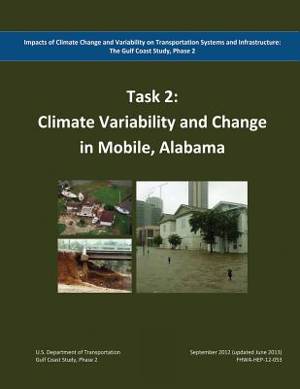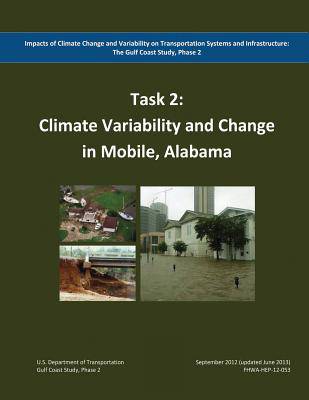
Wil je zeker zijn dat je cadeautjes op tijd onder de kerstboom liggen? Onze winkels ontvangen jou met open armen. Nu met extra openingsuren op zondag!
- Afhalen na 1 uur in een winkel met voorraad
- Gratis thuislevering in België vanaf € 30
- Ruim aanbod met 7 miljoen producten
Wil je zeker zijn dat je cadeautjes op tijd onder de kerstboom liggen? Onze winkels ontvangen jou met open armen. Nu met extra openingsuren op zondag!
- Afhalen na 1 uur in een winkel met voorraad
- Gratis thuislevering in België vanaf € 30
- Ruim aanbod met 7 miljoen producten
Zoeken
Impacts of Climate Change and Variability on Transportation Systems and Infrastructure
The Gulf Coast Study, Phase 2: Climate Variability and Change in Mobile, Alabama (Task 2)
Federal Highway Administration, U S Department of Transportation
Paperback | Engels
€ 62,45
+ 124 punten
Omschrijving
Despite increasing confidence in global climate change projections in recent years, projections of climate effects at local scales remains scarce. Location-specific risks to transportation systems imposed by changes in climate are not yet well known. However, consideration of these long-term factors are highly relevant for infrastructure components, such as rail lines, highways, bridges, and ports, that are expected to provide service for up to 100 years. To better understand climate change impacts on transportation infrastructure and to identify potential adaptation strategies, the U.S. Department of Transportation (USDOT) is conducting a comprehensive multiphase study of climate change impacts in the Central Gulf Coast region. This region was selected as the study's focal point due to its dense population and complex network of transportation infrastructure, as well as its critical economic role in the import and export of oil, gas, and other goods. The study is funded by the USDOT Center for Climate Change and Environmental Forecasting and managed by FHWA. The Gulf Coast Study has two distinct study periods: Phase 1 (2003 to 2008) examined the impacts of climate change on transportation infrastructure at a regional scale; and Phase 2 is focusing on a smaller region, enhancing regional decision makers' ability to understand potential impacts on specific critical components of infrastructure, and to start evaluating adaptation options. This report, the Task 2 report, lays the climate data foundation upon which a vulnerability assessment will be conducted in the next task. In future steps of the project, a vulnerability screen will be conducted along with an assessment of the highly critical assets identified previously under Task 1, as reported in the Task 1 final report Assessing Infrastructure for Criticality in Mobile, AL. This report explores potential changes in five primary climate variables: temperature, precipitation, streamflow, sea level rise, and storm surge in Mobile, AL, the location selected as the study area for Phase 2. To do so, Task 2 characterizes the current climate conditions in Mobile, and then uses downscaled climate projection data, as well as sea level rise and storm surge modeling, to develop plausible climate futures. The climate information discussed in this report will be used to assess how the transportation system in Mobile might be affected by climate change. Although this report does focus on Mobile, AL, the processes developed under this Task can be replicated by other transportation organizations across the country. The ultimate goal of this report is to not just identify how climate could change in Mobile, but also to develop robust methodologies, and identify existing datasets and tools, for developing these plausible climate futures. Furthermore, the work conducted under Task 2 will help inform the development of tools and resources to make these types of analyses easier for transportation agencies. To that end, the process of Task 2 is just as important as the results.
Specificaties
Betrokkenen
- Auteur(s):
- Uitgeverij:
Inhoud
- Aantal bladzijden:
- 492
- Taal:
- Engels
Eigenschappen
- Productcode (EAN):
- 9781507886045
- Verschijningsdatum:
- 7/02/2015
- Uitvoering:
- Paperback
- Formaat:
- Trade paperback (VS)
- Afmetingen:
- 216 mm x 280 mm
- Gewicht:
- 1129 g

Alleen bij Standaard Boekhandel
+ 124 punten op je klantenkaart van Standaard Boekhandel
Beoordelingen
We publiceren alleen reviews die voldoen aan de voorwaarden voor reviews. Bekijk onze voorwaarden voor reviews.











